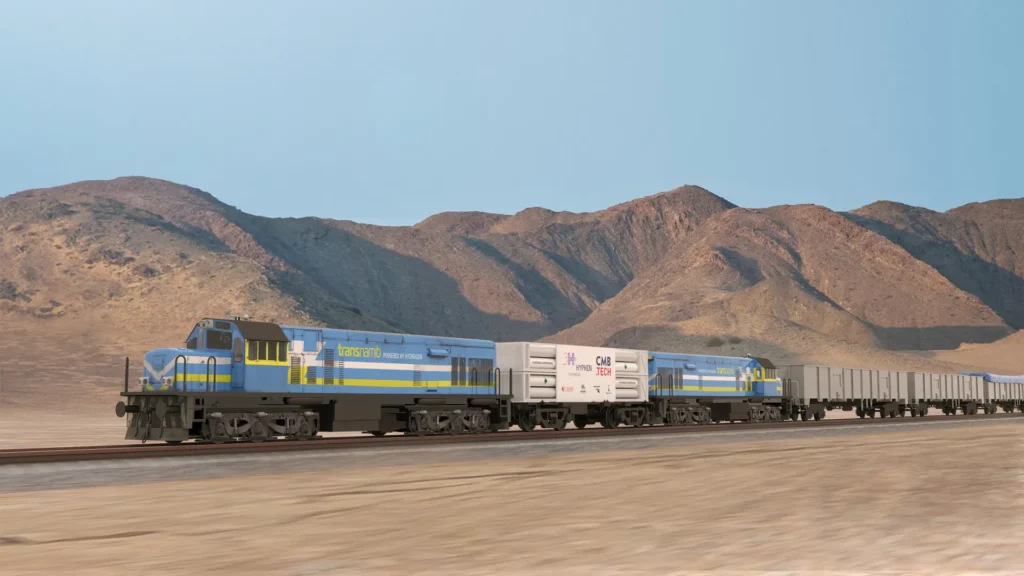Namibia has finalized a groundbreaking project involving the conversion of traditional locomotives to hydrogen power with the creation of a hydrogen train. This initiative, known as the HyRail project, marks a significant advancement in sustainable transportation, promising to potentially revolutionize the rail industry in Namibia.
Sustainable transportation
The HyRail project is a collaborative effort led by TransNamib and Hyphen Technical, with support from CMB Tech and academic insights from the University of Namibia (UNAM). The initiative aims to convert two locomotives into dual-fuel systems that can operate using both diesel and hydrogen.
According to reporting by Railways Africa, Director General of the National Planning Commission, Obeth Kandjoze announced that the project will demonstrate the use case of hydrogen in the rail transportation sector, in the form of a dual-fuel converted train. “The locomotive conversion is anticipated to commence in the latter part of the year, and initial timelines suggest that it will be commissioned before the end of 2025,” said Kandjoze. Kandjoze emphasized the project’s role in demonstrating hydrogen’s viability as an alternative fuel in rail transportation.
The HyRail project will be Africa’s first hydrogen train. Konrad Boshoff, CEO of Hyphen Technical, claimed that the project has generated significant local and international interest from entrepreneurs.
Enhancing rail transport capabilities
The contract encompasses the conversion to hydrogen dual-fuel of two locomotives and a hydrogen fuel tender wagon and HyRail’s objectives extend beyond conversion. The project also includes comprehensive studies on the feasibility and environmental impacts of using hydrogen in rail operations. These studies aim to assess the safety, performance, and material compatibility of hydrogen technology specifically for rail applications.
Boshoff of Hyphen Technical explained that the converted locomotives would undergo dynamic testing in trial service by the last quarter of 2025. The ultimate goal is to use these locomotives to transport essential commodities like copper concentrate and manganese, significantly reducing the carbon footprint of these operations.
Economic and environmental benefits
The introduction of hydrogen-fueled trains is expected to provide substantial economic benefits. By reducing reliance on imported diesel, Namibia can decrease its transport costs and increase the financial viability of its rail system. Additionally, this shift to a cleaner energy source aligns with global environmental goals and enhances Namibia’s competitiveness in the green technology arena.
The total investment for the HyRail project is estimated at €9.17 million, encompassing all pilot work and related research activities. Funding is expected through a combination of grants, secured loans, and capital from project shareholders, underscoring the broad-based support for this innovative venture.
A vision for the future
Looking forward, the success of the HyRail project could lead to further expansion of hydrogen infrastructure along Namibian rail corridors. This expansion would facilitate cheaper and more environmentally friendly transport options for a range of freight and commodities, significantly altering the logistics landscape in Southern Africa.
As Namibia continues to attract global interest in its clean hydrogen projects, with potential investments surpassing €2 billion, the nation is poised to become a significant player in the international green energy market. The hydrogen train project not only supports this ambition but also showcases Namibia’s commitment to sustainable development and technological innovation in transportation.
Visit our dedicated archives for more logistics news.

1 Comment
I am delighted that our rail network operator TransNamib is continuing to develop and look to the future with joint visionary projects with Hyphen Technical. The news that this will be an ecologically and socially constructive project in an economically and socially underdeveloped region is all the more gratifying. I also hope that it will be an impetus for TransNamib to repair and expand its infrastructure, because a lot needs to be done to keep the Visionary Trains safe on the tracks. The current trains often derail due to washed out tracks, vandalism and poor management. But this should all be solvable if the right people believe in a sustainable ecological and social future for the nation.